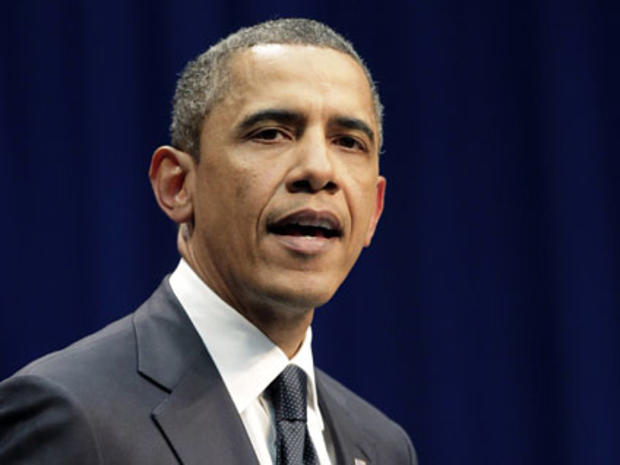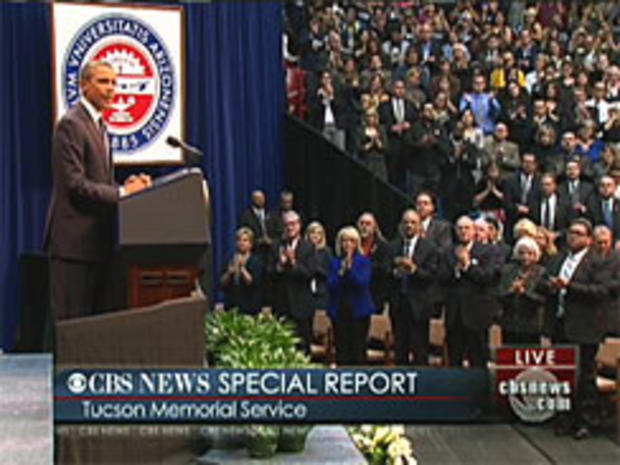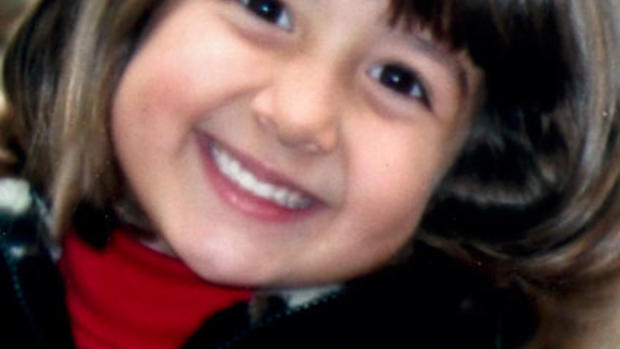Obama Calls for Civility in Wake of Tragedy
For the most part, the response to the Tucson tragedy has been a dispiriting spectacle. Within hours of the shooting, some on the left were pinning the blame in part on Sarah Palin, despite the lack of evidence that alleged shooter Jared Loughner had been inspired by her rhetoric.
Then some on the other side began attacking the left for politicizing the tragedy - accusations, of course, that were themselves a politicization of the tragedy. Instead of remembering the victims of the attack, many became embroiled in a desperate and misguided attempt to tie a suspect with a muddled belief system to their political opposition.
Obama: Rep. Giffords "Opened Her Eyes" Today
Text of Obama Speech
Giffords' Friends in Room When She Opened Eyes
Special Section: Tragedy in Tucson
Before his speech in Tucson Wednesday night to make the tragedy, Republicans warned President Obama not to politicize the event - not to make it about the incendiary rhetoric that dragged down the discourse during the midterm election season. Yet when a member of Congress is shot at point-blank range, such rhetoric inevitably becomes a part of the national conversation.
And so Mr. Obama didn't shy away from the question of the national discourse. But when he stepped into the fray, he offered something few others have in the wake of the tragedy: A call for Americans to reset the debate into something productive.
"At a time when our discourse has become so sharply polarized - at a time when we are far too eager to lay the blame for all that ails the world at the feet of those who think differently than we do - it's important for us to pause for a moment and make sure that we are talking with each other in a way that heals, not a way that wounds," he said.
Mr. Obama noted that Saturday's events couldn't be explained away by rhetoric, no matter how incendiary. The actions of the murderer were not, he rightfully said, the result of a "simple lack of civility." Yet he said that doesn't mean that it is not a moment to strive for a greater civility - to remember that "a more civil and honest public discourse can help us face up to our challenges as a nation."
He spent much of the speech honoring the fallen and the heroes that emerged in the wake of the attack - telling the stories of the everyday Americans who lived and are living inspiring lives, the people who've been too quickly cast from our thoughts in recent days in the rush to score political points.
He asked: "How can we honor the fallen? How can we be true to their memory?"
And he answered: By remembering to be the people we want to be, not the ones we too often let ourselves become.
"If this tragedy prompts reflection and debate, as it should, let's make sure it's worthy of those we have lost," said Mr. Obama. "Let's make sure it's not on the usual plane of politics and point scoring and pettiness that drifts away with the next news cycle."
It was a broadside against the worst excesses of the debate since Saturday - the finger-pointing and nasty attacks that are too often the default setting in our national discourse. The speech was not a call for Americans to paper over their differences - a healthy debate over how to keep another tragedy from taking place, he said, is "an essential ingredient in our exercise of self-government."
But it was a call for Americans to remember the point of that debate: Not to score points but to move forward and make their country a better place.
"We should be willing to challenge old assumptions in order to lessen the prospects of such violence in the future," he said. "But what we can't do is use this tragedy as one more occasion to turn on one another. That we cannot do. That we cannot do."
"As we discuss these issues, let each of us do so with a good dose of humility," continued the president. "Rather than pointing fingers or assigning blame, let's use this occasion to expand our moral imaginations, to listen to each other more carefully, to sharpen our instincts for empathy, and remind ourselves of all the ways that our hopes and dreams are bound together."
It was a message that sought to transcends the politics into which the debate has descended, a call to reflect on whether we're living the lives to which we aspire.
"That process of reflection, of making sure we align our values with our actions - that, I believe, is what a tragedy like this requires," said the president. "For those who were harmed, those who were killed - they are part of our family, an American family 300 million strong."
Despite the somber occasion, what Mr. Obama offered was ultimately not a lament but a celebration. A celebration of lives lost too soon, of lives still being lived, and of American potential - of the fact that no matter how much we tear at each other, we have not lost the capacity to rise to the occasion.
"I believe we can be better," he said. "Those who died here, those who saved lives here - they help me believe. We may not be able to stop all evil in the world, but I know that how we treat one another is entirely up to us. I believe that for all our imperfections, we are full of decency and goodness, and that the forces that divide us are not as strong as those that unite us."
And that, he told his countrymen Wednesday night in Tucson, is something that no amount of the partisan bickering, no ideological fights or madman's bullets, can ever change.
Brian Montopoli is a political reporter for CBSNews.com. You can read more of his posts here.


